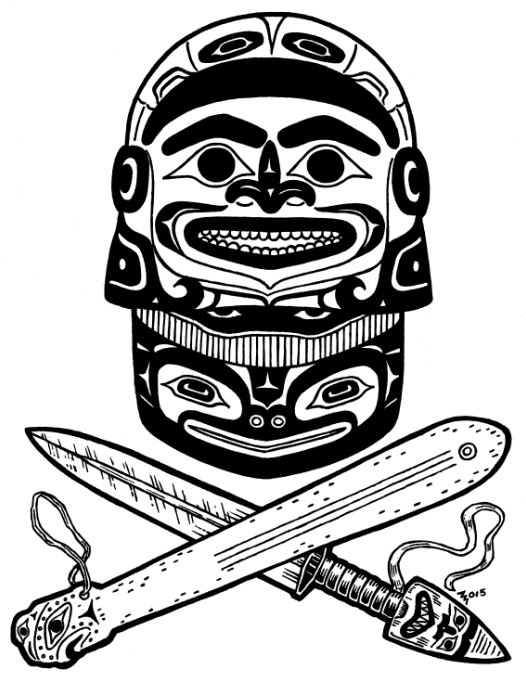Blog Archives
Amazon tribe blockade railroad in protest against Brazilian mining giant

Warriors of the Awa tribe in the Amazonian region of Brazil blockade train tracks used by mining corporation, June 2016. Photo: Survival International.
Survival International, June 17, 2016
Members of Brazil’s Awá tribe have blockaded a railroad owned by Vale mining company in the eastern Amazon.
The company has moved to expand the railroad, but the Awá say the expansion will increase the number and size of trains which transport iron ore from the Carajás mine to the port of São Luis – and that this will make it harder for them to hunt for food. Read the rest of this entry
Brazil Suspends License for Controversial Amazon Dam
 Wednesday, April 20, 2016
Wednesday, April 20, 2016FOR IMMEDIATE RELEASE
Brasilia, Brazil: In a surprising move, IBAMA, the administrative arm of the Brazilian Ministry of the Environment, suspended the process of environmental licensing for the controversial São Luiz do Tapajós Dam in the Brazilian Amazon yesterday. International Rivers welcomes this decision as an important breakthrough for the protection of rivers and indigenous rights in the Amazon.
The Ka’apor of Brazil Use Bows, Arrows, Sabotage and GPS to Defend the Amazon from Logging

Ka’apor Indians stand next to a logging tractor that they discovered and set on fire inside the indigenous territory one month before. Photograph: Lunae Parracho/Greenpeace
by Jonathan Watts, The Guardian, Sept 10, 2015 (via Earth First! Newswire)
With bows, arrows, GPS trackers and camera traps, an indigenous community in northern Brazil is fighting to achieve what the government has long failed to do: halt illegal logging in their corner of the Amazon.
The Ka’apor – a tribe of about 2,200 people in Maranhão state – have organised a militia of “forest guardians” who follow a strategy of nature conservation through aggressive confrontation. Read the rest of this entry
Munduruku Indians occupy Brazil government building
By Sid Douglas, The Speaker, Nov 28, 2014
A band of Munduruku Indians occupied a Brazilian government building in Itaitiba city, Para state, Friday, demanding that the government address the problem of loggers and gold miners incurring on their traditional land. The tribe held the building’s staff hostage peacefully, but threatened “a conflict of unimaginable proportions” if the government did not take action and the invaders persisted, which, they said, the government would be responsible for.
“We want [politicians in] Brasília to quickly demarcate our land,” said the chief Juarez Saw Munduruku, “because we look after this land much better than the Brazilian government bodies do.” Read the rest of this entry
PHOTO REPORT: Amazon Indian Warriors Beat and Strip Illegal Loggers in Battle for Jungle’s Future

Ka’apor warriors stand guard over illegal loggers they tied up during a jungle expedition to search for and expel them from the Alto Turiacu Indian territory.
By David Sim, International Business Times, September 4, 2014
Photographer Lunae Parracho followed the Ka’apor warriors during their jungle expedition to search for and expel illegal loggers from the Alto Turiacu Indian territory in the Amazon basin.
The World Cup Mega-Disaster Is On
 By Hanna Hurr, Mask Magazine, June 12, 2014
By Hanna Hurr, Mask Magazine, June 12, 2014
The World Cup started today, and with it the culmination of a much longer power battle between Brazilians who vehemently detest the World Cup and the authorities who defend it.
Hours before the opening game of the World Cup, Brazilians took to the streets once again to protest and disrupt the games — the most expensive World Cup in history, which cost Brazil over $11 billion. In São Paulo, Rio de Janeiro, and Belo Horizonte, protesters clashed with police while blocking a highway, trying to enter a stadium, protesting public spending, and rioting. Read the rest of this entry
Brazil: land disputes spread as Indians take on wildcat miners

Munduruku Indian warriors stand guard over an illegal gold miner who was detained by a group of warriors searching out illegal gold mines and miners in their territory near the Caburua river, a tributary of the Tapajos and Amazon rivers in western Para state January 20, 2014.
By Lunae Parracho and Caroline Stauffer, Reuters, Feb 17, 2014
As Brazil struggles to solve land disputes between Indians and farmers on the expanding frontier of its agricultural heartland, more tensions over forest and mineral resources are brewing in the remote Amazon. Read the rest of this entry
Brazil: Munduruku People Kick Miners Off Indigenous Territory, Seize Equipment
by Larissa Saud, Terra Magazine
Translated from Portuguese by Thomas Walker / Earth First! Newswire, Feb 3, 2014
Night had hardly arrived when indigenous Munduruku people landed on the bank of a mine on Tropas River, a tributary of Tapajós river, in a region west of Pará. From the five speedboats, all of them full, came warriors and children, all with one objective: to drive out illegal miners from Munduruku land. Read the rest of this entry
Murder and Protest in Brazil Reveal Threats Faced by Natives
David Dudenhoefer, Indian Country Today, Dec 10, 2013
A protest last week in Brazil’s capital and recent acts of violence against indigenous leaders serve as grim reminders of the deprivation and danger that many Native Brazilians face. Read the rest of this entry




